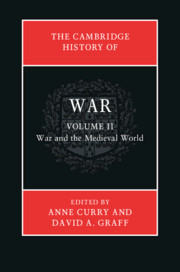Book contents
- The Cambridge History of War
- The Cambridge History of War
- Copyright page
- Contents
- Illustrations
- Maps
- Notes on contributors
- Introduction to volume II
- Part I Foundations, c.600–1000 ce
- Part II Interactions, c.1000–1300 ce
- Part III Nations and Formations, c.1300–1500 ce
- Part IV Comparisons: Cross-Cultural Analysis
- 22 Justifications, theories, and customs of war
- 23 Land technologies
- 24 Maritime technologies
- Select bibliography
- Index
22 - Justifications, theories, and customs of war
from Part IV - Comparisons: Cross-Cultural Analysis
Published online by Cambridge University Press: 25 September 2020
- The Cambridge History of War
- The Cambridge History of War
- Copyright page
- Contents
- Illustrations
- Maps
- Notes on contributors
- Introduction to volume II
- Part I Foundations, c.600–1000 ce
- Part II Interactions, c.1000–1300 ce
- Part III Nations and Formations, c.1300–1500 ce
- Part IV Comparisons: Cross-Cultural Analysis
- 22 Justifications, theories, and customs of war
- 23 Land technologies
- 24 Maritime technologies
- Select bibliography
- Index
Summary
The ways in which different medieval cultures justified war, theorized about war, and developed different customs that shaped the conduct of warfare varied widely. While the many “cultures of war” that emerged in the medieval world shared some basic characteristics, what is more broadly comparable are the processes or dynamics that shaped military cultures around the world. This chapter will explore, comparatively and as globally as the evidence allows, those dynamics and the cultural patterns they produced. It will argue that cultures of war emerged from a series of intersections between ideas about war on the one hand, and the various contexts within which wars happened – geographic, socioeconomic, and political – on the other. These intersections shaped cultures of war at the broadest level, and more specifically complicated the development of justifications of war, theories about war and its uses, and the customs that influenced the conduct of warfare within individual cultures.
- Type
- Chapter
- Information
- The Cambridge History of War , pp. 615 - 639Publisher: Cambridge University PressPrint publication year: 2020

